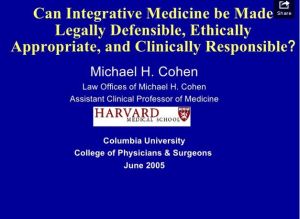How can integrative medicine be made “clinically responsible, ethically appropriate, and legally defensible?” 
To answer the question, I reviewed several different areas of law affecting integrative medicine:
- Licensure, credentialing, accreditation
- Scope of practice
- Professional discipline
- Malpractice liability (with an eye toward risk management strategies)
- Vicarious liability for referrals to complementary and alternative medicine providers
- Ethical issues
- Billing, coding, and insurance
- Healthcare fraud
- Physician recommendations and sales of dietary supplements; nutritional care
In various articles and book chapters, I analyzed these same issues across various medical specialties, including:
- integrative cardiology
- integrative oncology
- integrative psychology
- integrative psychiatry and integrative mental health care counseling
- evidence-based integrative medicine generally
- integrative pediatrics
- integrative nephrology & kidney care
- other integrative specialties
Today, our law firm represents many integrative medicine practitioners. We would add to the list above, issues such as:
- opting out of Medicare
- concierge medical practices
- Stark, self-referral, anti-kickback, and fee-splitting (particularly regarding compensation issues)
- corporate practice of medicine and unlicensed medical practice
- telemedicine, digital health, and online integrative consults
- mobile (m-health) medicine and mobile medical apps
We have counseled integrative medicine groups, clinics, and startups all over the country on specialized, niche legal and regulatory issues relating to the inclusion of complementary and alternative medicine (CAM) therapies into conventional medical settings (academic or otherwise), and to integrative medicine practices in general.

Contact our healthcare law and FDA attorneys for legal advice relevant to your healthcare venture.
Contact Us

